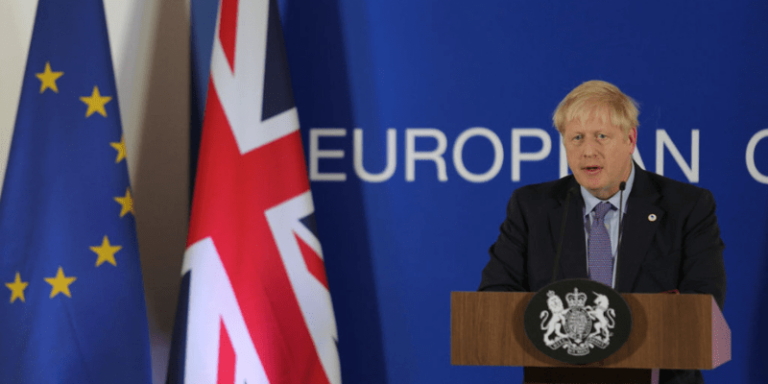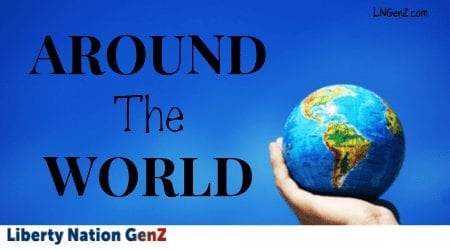Johnson Leads the UK out of the EU
Britain is leaving the European Union - but what is Brexit, anyway?
By: Mark Angelides | January 31, 2020 | 501 Words

Boris Johnson in front of the British and European Union flags. (Photo by Nicolas Economou/NurPhoto via Getty Images)
On January 31 at 11 p.m., Britain will leave the European Union (E.U.). Since voting to leave the union back in 2016, Great Britain has been through three Prime Ministers, two General Elections, and three and a half years of arguments. Finally, newly elected Prime Minister Boris Johnson has passed the final laws needed for leaving.
A European Clash
In 1973, Britain joined the European Communities (E.C.), which was a fairly simple trade organization made up of just eight other countries including France and Germany. Then, in 1975, the E.C. developed to become what is today known as the Common Market or ECC.
As the years went on, this group demanded more and more national sovereignty to be handed over from its member countries. The trading bloc grew, adding new European nations. Treaties were signed by the governments that handed power to the group. These new treaties formed the what we today call the E.U. Many thought this was a price worth paying to be part of a large trading bloc.
But not everyone.
Political Pressure
A Euro-Skeptic movement began around the same time that the E.U. was pressuring Britain to adopt the Euro as its currency. It took over 20 years of campaigning, but pressure from the United Kingdom Independence Party (UKIP) forced Prime Minister David Cameron to offer an In/Out referendum on continued membership of the E.U.
A Brexit Referendum
 All leaders of the main political parties campaigned for Britain to remain part of the European Union. UKIP and several grassroots movements campaigned to leave. On June 23, 2016, the public went to the ballot boxes. Most people predicted the Remain side would win, but the final result was 52% to leave and 48% to remain.
All leaders of the main political parties campaigned for Britain to remain part of the European Union. UKIP and several grassroots movements campaigned to leave. On June 23, 2016, the public went to the ballot boxes. Most people predicted the Remain side would win, but the final result was 52% to leave and 48% to remain.
Brexit Delayed
Because Prime Minister Cameron had campaigned to remain in the E.U., he felt he should not be the person responsible for taking Britain out. Theresa May became the new prime minister.
The country remained divided between those who won the referendum and those who wanted to ignore the vote and carry on as before. Prime Minister May was unable to pass any laws in Parliament, and without support, could not govern. She was replaced by Boris Johnson, who was finally able to take action and “get Brexit done.”
What Comes Next?
Although Britain officially leaves on January 31, this does not mean the relationship is over. During the next year, the British parliament will negotiate with E.U. leaders to determine if a trade deal can be reached. So far, the E.U. is asking for a “level playing field,” which means political and legal alignment on rules and regulations. Boris Johnson has ruled this out, suggesting this alignment is what began Brexit in the first place.
If no trade deal is reached by the end of 2020, Britain will revert to trading on World Trade Organization terms, no different to any other country outside of the E.U. Whether PM Johnson wins another election will depend on how well he manages these negotiations.
















